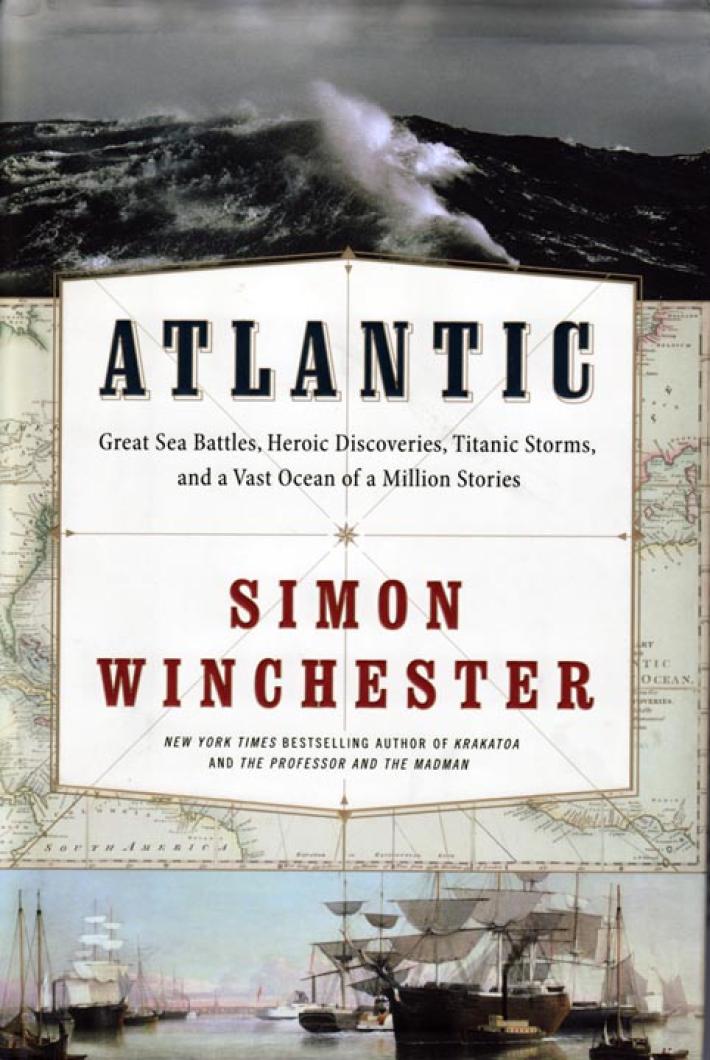Atlantic: Great Sea Battles, Heroic Discoveries, Titanic Storms, and a Vast Ocean of a Million Stories, by Simon Winchester, HarperCollins Publishers, 496 pages, illustrated. $27.99.
It would be hard to live on the Vineyard and not have an interest in the Atlantic Ocean. So much of the Island has been colored and shaped by the sea. You can smell the ocean here and feel it all around you.
A new book, Atlantic, is a biography of the ocean. What is most striking about this long book is its scope.
English author Simon Winchester has written 19 books, including Krakatoa and The Professor and the Madman. In 2006, he was appointed an Officer of the Order of the British Empire by Her Majesty The Queen.
And while there is no mention of Martha’s Vineyard in the book, it will nevertheless be of interest to Island readers and New England mariners for the fact that it explores the human connection to the sea.
It is the author’s premise that the very beginning of man’s spread across the continents was an Atlantic shoreline and sea story. Mr. Winchester writes about this history in a long series of short stories. Sitting down with a hot cup of cocoa on a cold and snowy winter day, a few miles from the roaring sea at South Beach, the reader can travel back in time to when the Vikings sailed the high seas in their fragile crafts for three centuries as intrepid explorers. “They were a highly mobile people, the maritime equivalent of the so-called wagon folk, those who in early civilization favored wandering as opposed to settlement, who were determined and nomadic pastoralists rather than fence-building and wall-constructing agriculturalists,” the author writes.
For those who love cod, there are stories about man’s pursuit of this abundant fish, its popularity before refrigeration and before the invention of the hamburger. It begins with the Basque fishermen crossing the Atlantic to the waters off Newfoundland, possibly long before Columbus was born.
Mr. Winchester takes his readers to Gibraltar, from the Skeleton Coast in Africa to Cape Horn in South America, and to Reykjavik, a city I can spell but not pronounce.
The whaling era of the 1800s occupies another chapter in this maritime story that at times feels as wide and large as the Atlantic itself.
We learn of piracy and the slave trade, a dark part of the history of man’s use of sailing ships. The brutality of that age of sail is hard to fathom; even the stories coming out of Somalia these days seem tame by comparison. “Eleven million Africans were carried westward across the Atlantic between the middle of the fifteenth century and the end of the nineteenth. Three million of them were carried in British ships, owned by slave traders based in Liverpool, Bristol . . ., ” the author writes.
Of course any story about the Atlantic Ocean must include commerce and war, skill and bravery.
Mr. Winchester quotes Winston Churchill: “The Battle of the Atlantic was the dominating factor all through the war.”
And the author writes: “The battle lasted all six years of the war: 3,500 Allied merchant ships and almost two hundred warships were sunk by submarines, and nearly eight hundred German U-boats were sunk in retaliation.” He writes that out of that war 60,000 seaman “now lay at the bottom of the Atlantic Ocean.”
Buried deep in the book, on page 332, the author shares with the reader perhaps much of the impetus for writing this book: So much has changed, not just of the ocean, but of the human regard for it.
“The fact of inexpensive transoceanic travel has taken much of the mystery of the sea away, has made us indifferent to its existence. Since the crossing of oceans has become tedious to most who do it, the oceans themselves have become the object of tedium as well. Once they were feared; they inspired awe, amazement and mystery. Now they are to many just a barrier, an inconvenience — too large as entities properly to contemplate, too annoying as presences to warrant much care. The public attitude to the great seas has changed — and this change has had consequences for the great seas, few of them any good.”
Think about that the next time you sit on a towel at the beach and look out toward the Azores, and imagine the huge expanse that lies beyond.







Comments
Comment policy »